
Lizzie (center), Ilse (bottom right), Hans (bottom left) Fritz (bottom center) and their parents.
When her parents escorted 16-year-old Alice, my aunt, to the Vienna train station, her father was crying. Her mother on the other hand, remained strong and optimistic. “She said, ‘We’re going to see each other again,’” Alice, nicknamed Lizzie, remembered. ”And I was like, I’m going to England, and I’ll be able to improve my English.” Seventy-five years ago today, on December 2, 1938, the first “Kindertransport” arrived from Germany in England.
Seventy-five years ago this week, the first group of children arrived without their parents at the Essex port of Harwich, and took a train to London’s Liverpool Street station. After the war, many of the children settled in Britain, their families having been murdered by the Nazis.These are the stories of five of those children.
Monday is world Kindertransport Day: the 75th anniversary of one of the great humanitarian missions of modern times. Imagine a world where 10,000 children were rescued from the holocaust by the kindness of strangers.
Marking the 75th anniversary of the Parliamentary debate that led to their rescue, the event began with a ceremony to rededicate the commemorative plaque unveiled in 1999 in gratitude for Parliament’s decision in November 1938 to start up the Kindertransport. Paying tribute to the Kinder, Speaker John Bercow also noted the huge strides made in the protection of human rights since the Holocaust.
Monday is World Kindertransport Day, with events to mark the anniversary in many countries. Seventy-five years ago this week, the first group of kids arrived without their parents at the English port of Harwich, and took a train to London’s Liverpool Street Station. Some 10,000 children, most but not all Jewish, would escape the Nazis in the months to come — until the outbreak of war in September 1939, when the borders were closed.
LONDON — The operation was called Kindertransport – Children’s Transport – and it was a passage from hell to freedom. Kristallnacht had just rocked Nazi Germany. The pogroms killed dozens of Jews, burned hundreds of synagogues and imprisoned tens of thousands in concentration camps. Many historians see them as the start of Hitler’s Final Solution.
Seventy-five years ago this week, the first group of kids arrived without their parents at the English port of Harwich, and took a train to London’s Liverpool Street Station. Some 10,000 children, most but not all Jewish, would escape the Nazis in the months to come — until the outbreak of war in September 1939, when the borders were closed.
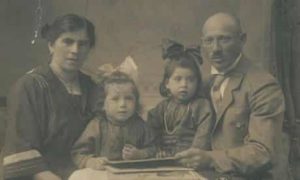
Judy Benton as a child (second from right) with her family. Her parents later died in Auschwitz
When Hitler came to power, everything changed. By 1938 the Hitler Youth were very visible in my school. Suddenly no one spoke to me – if they did, they got into trouble. I was moved to the back of the class and my desk was painted yellow and said “here sits a dirty Jewish girl”. My work was no longer corrected, and despite being top of my class, I was not allowed to win the first place award – a copy of Mein Kampf.

World Kindertransport Day Proclamation
KT2 David Meyerhof, resident of Burbank, California has made this happen! He will be speaking with Kind Suzanne Goldsmith on December 2nd, see the events page listing.
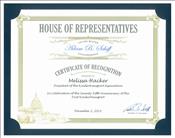
Adam Schiff, representative of the 28th District of California recognizes the Seventy Fifth anniversary of the Kindertransports. Thanks to KT2 David Meyerhof, resident of Burbank, California. David will be speaking with Kind Suzanne Goldsmith on December 2nd, see the events page listing.

Susanne Goldsmith. Goldsmith, 82, was whisked out of Nazi-occupied Vienna with her brother Peter on Dec. 10, 1938 on a Kindertransport. (Photo by John McCoy)
Young Susanne and Peter Weiss had been whisked to England two years earlier when a strange couple appeared on their doorstep. The two Jewish children hadn’t seen their parents, Hans and Margaret, since fleeing Vienna aboard a Kindertransport. “They looked like such refugees,” recalled Susanne Goldsmith, now 82, of Burbank, of that day more than 70 years ago. “They were poorly dressed. They were haggard. Neither of us wanted to join them. “But we did — my parents didn’t give up.”
Leo Metzstein, was one of the last of 10,000 Jewish children to flee Germany under the Kindertransport scheme before the war broke out in 1939. Born in Berlin, he was the youngest of five Metzstein children to escape the country in August 1939, with his sister Jenny. He lived in Hamilton, South Lanarkshire. He was the brother of the acclaimed architect Isi Metzstein, who died in January 2012.
The revival of Diane Samuels’ Kindertransport has been prompted by the 75th anniversary of the first arrivals of the kinder, something that has led to another play on the subject, Suitcase, also touring this autumn.
A video interview is online with Kindertransportee Susanne Weiss Goldsmith and KT2 David Meyerhof. The City of Burbank, CA proclaims December 2, 2013, World Kindertransport Day.
The purpose of Student Awareness Day on the Kindertransport was to honor survivors, their parents and the people who saved the lives of 10,000 children. “Our students understood that the Holocaust should be viewed in various perspectives and the Kindertransport is one of them,” Riviera Beach Prep Teacher Toshimi Abe-Janiga. “They made a personal connection between the past and the present and through Holocaust Education, we hope they can take action to prevent prejudice and discrimination.”
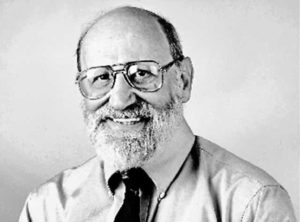
Harry Themal, Deleware News Journal columnist
This has been an important year for memorable anniversaries but for this columnist the most important occasion was 75 years ago. That was when England created the Kindertransport and 10,000 mostly Jewish children, including myself, were brought to safety from the Nazi terror. Thanksgiving is an apt time to remember our English rescuers.
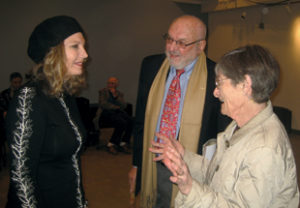
Performer Mona Golabek (left) chats with Ralph Samuel of Oakland and Ilse Eden of Berkeley. photo/dan pine
With anti-Semitism rampant and war looming, Ralph Samuel fled his hometown of Dresden, Germany, for safety in England. He was all alone. Then only 7, Samuel was one of nearly 10,000 Jewish children who escaped Germany and Austria in the famed Kindertransport.
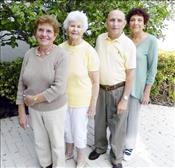
From left, Rella Adler, Lisa Saretzky, Mark Burin and Anita Hoffer will share their experiences as participants in the Kindertransport during a Dec. 8 program commemorating the 75th anniversary
Anita Lowenberg was living in Berlin with her mother and grandparents in June 1939 when the 6-year-old was told one morning to pack some clothing. Lowenberg soon joined other children on a train to Holland and then a ferry to London as part of the Kindertransport. Now Anita Hoffman, 80, of Boca Raton, will join other Florida members of the Kindertransport at a Dec. 8 cocktail reception and program in Boca Raton to commemorate the 75th anniversary of the Kindertransport.
On the evening of Dec. 2, a group of elderly men and women, some with their children and grandchildren, will gather at a Burbank mall to mark the 75th anniversary of a heartbreaking, yet uplifting, episode of the Nazi era, known as the Kindertransport (in English, Children’s Transport). The event, part of the Temple Beth Emet Chanukah program, will start at 7:30 p.m. on the second floor of the Burbank Media Center Mall, at 245 E. Magnolia Blvd., Burbank. The public is invited.
Between 1938 and the outbreak of World War II, thousands of Jewish children living in Germany were sent to Great Britain on the Kindertransport. This move saved them from the concentration camps their parents would soon face. Diane Samuels’ play offers deep insight into themes of abandonment, identity, survivors’ guilt, and the effects of a traumatic past on those near to us. The story follows Eva, a 9 year old Kind, and the effect her mother’s fateful decision had on a generation of women.